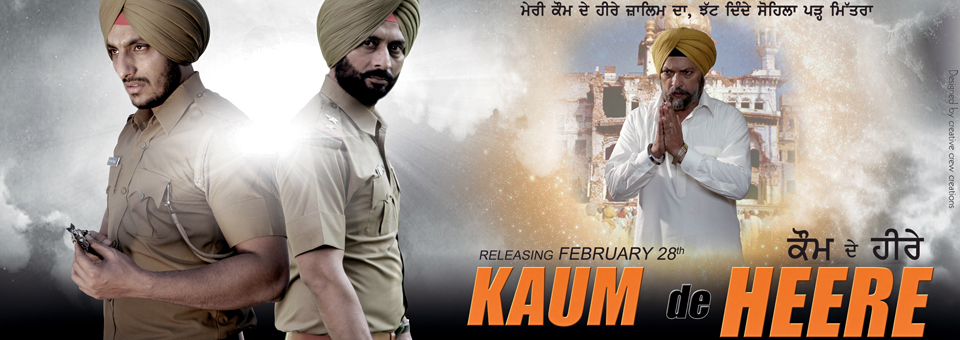It’s not often that a film is released based on Sikh history so when one does come out it fills me with great excitement. Knowing that such films are likely to be restricted by a very low budget I try to brace myself for the eventual disappointment when compared with the mega budget blockbusters of Hollywood that I’m accustomed to watching. Also producers can count on such films facing a blanket ban in India as was the case with this film which itself makes it harder to raise funds (I won’t be going into the merits/detriments of such a ban as these have already been discussed here before). I was pleasantly surprised to find ‘Kaum De Heere’ was a good Punjabi film but it is with a heavy heart that I must also say in terms of content it was a rather poor Sikh film.
I’m not a traditional watcher of Indian or Punjabi films and get rather irritated with all the songs that directors manage to squeeze in, though in this particular film I must say that the songs were quite good and not overdone with the film being of reasonable length – 120 minutes. The subtitles were a bit of a let down in that they were missing for parts of the dialogue, though if you are remotely familiar with Punjabi you should still be able to piece it together. At times the acting and dialogue was particularly good, for example between Satwant Singh and his fiancée and the portrayal of Punjabi village life was believable. The jail scenes on the other hand were a major let down and the actual assassination scene was rather melodramatic.
As far as the historical content is concerned one has to allow for a little dramatisation to make for easier digestion. Even so I did find myself unable to reconcile how the film has portrayed some of the events. For instance Kehar Singh is shown as the mastermind behind the conspiracy though no explanation is given as to why in court he consistently denied being involved. Also the evidence against him was circumstantial at best (this was however enough for the corrupt judiciary to send him to the gallows).
The film also ignores the possible involvement of Indira Ghandi’s secretary R.K. Dhawan. One theory is that Dhawan leaked details of Operation Shanti to Beant Singh who then with Satwant Singh’s help assassinated Ghandi as a pre emptive measure. This would then mean that Beant Singh’s motivation was not revenge as the film would have us believe, but a well timed stratigic manoeuvre to prevent the mass loss of life. This would also be more in-keeping with Sikh ideology as revenge is an action derived out of anger. Such actions are more about making yourself feel better than seeking justice for wrongs and therefore have no place in the Sikh mindset.
If all you are after from watching a Punjabi film is a tragic love story then this film is for you, though if you are looking for a deeper understanding of the events of 1984 then you will still be left wanting. All in all this film is a good attempt to tell an important part of Sikh history from the perspective of Beant and Satwant Singh’s relatives, though I would encourage readers to appreciate other perspectives also.




